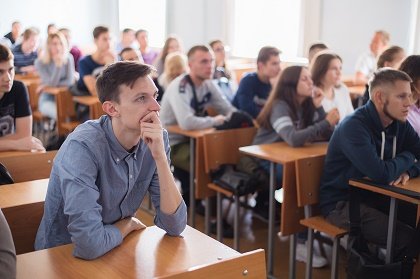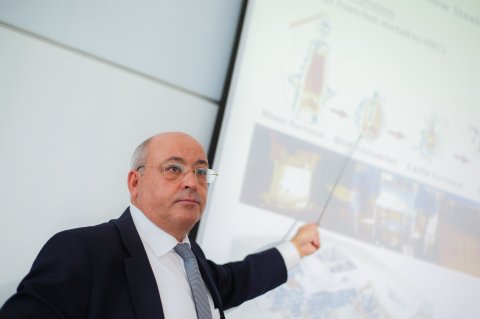On September 3, the President and Director General of SMS group Inc. (USA) Pino Tese visited South Ural State University, where he delivered a lecture.
Professor Pino Tese is a Professor of the Department of Machines and Processes of Plastic Metal Working, and regularly delivers lectures at SUSU. This time, he read a lecture about skin-pass mills for 4th-year students of the Faculty of Material Science and Metallurgical Technologies (MSMT).
Head of the Resource Center of Special Metallurgy, Associate Professor of the Department of Machines and Processes of Plastic Metal Working, Marina Samodurova, told us about importance of this lecture for MSMT students.
“The lecture concerned skin-pass mills, specifically the equipment and technology regarding metallurgical rolling production. Pino Tese talked about the most up-to-date trends and ideas, and about achievements of SMS Group Company in this area, as well as about the new theoretical and technological solutions in the sphere of using skin-pass mills, which nowadays are in-demand and actively used. SMS Group Company is the world’s leading manufacturer of metallurgical equipment, including such mills, worldwide; therefore, of course, the lecture was relevant and interesting. By the way, each year SMS Group Company provides employment at its enterprises for the best alumni of the Department.”


According to Marina Nikolaevna, any rolling shop of flat rolled products manufacturing has a skin-pass mill, which is needed to increase the quality of production. Prototypes of such mills are installed at the Laboratory of the Department of Machines and Processes of Plastic Metal Working, where students regularly have theory classes and practical training.
A student from the National School of Engineering in Saint-Etienne (France) Jan Chaitas, came to SUSU for 3-month-long internship. For him, this lecture is especially interesting, as he has already got experience of working with such equipment.
“This lecture was really useful, because in France we use such equipment at metallurgical enterprises.”
A student of MSMT, Vyacheslav Lezin, also shared his emotions.
“I’ve never heard about this type of rolling equipment or the effect that the material obtains after treatment with the use of it before. Today we considered a specific issue: how to get rid of the ‘orange peel’ on the surface of material under treatment. I liked the lecture; everything was understandable and interesting.”
It should be noted, that a lot of attention at the Department of Machines and Processes of Plastic Metal Working is paid to modern tendencies of development, both in equipment manufacture and in new technology that allow manufacturing high-quality products demanded in the market. For that, leadership and staff of the Department constantly work with industrial and academic partners, and develop bilateral connections which allow for performing internship and training of students in leading companies and universities of Russia and Western Europe (Germany, France, Poland, etc.).

.jpg)
From this academic year, the Department starts implementing project-based education of master’s degree students in the sphere of Additive Technology, which allows improving the quality of training of engineering cadres. This training sufficiently increases demand for the Department’s alumni in the labor market.
Under cooperation of the Department, a modern international Laboratory for Mechanics, Laser Processing, and Digital Technology had been created at SUSU, where presently research is carried out for such leading corporations of Russia as Transneft, Roscosmos, TNK, etc. All projects are being implemented with direct participation of students and postgraduates.
The Department’s experience in inviting top-managers of the world’s largest corporations as well as the world’s leading scientists from Russian and European universities for reading lectures gives students and staff the opportunity to improve their knowledge and competencies in the sphere of disciplines under study. And the fact that such cooperation is possible is proved by the high academic level of the Department’s and the university’s employees.




